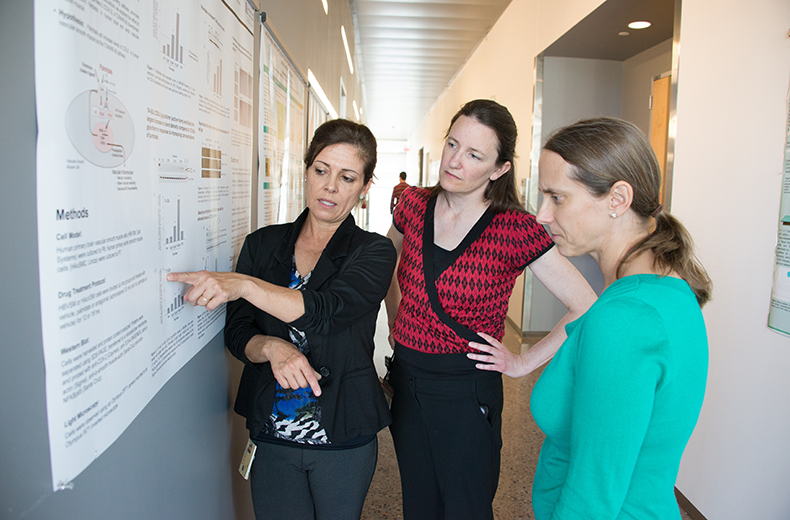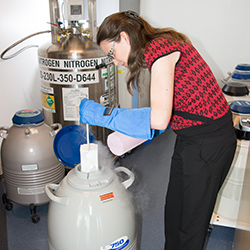
Faculty Spotlight: Taben Hale, PhD

Taben Hale, PhD, is an assistant professor in the department of Basic Medical Sciences at the UA College of Medicine – Phoenix.
With a focus on cardiovascular disease, her research is seeking to discover new ways to prevent the further deterioration of tissue after suffering an injury.
Education
Dr. Hale came to the desert in 2008 after completing her studies in her native Canada. She received her PhD from Queen’s University, near Toronto, working in the Department of Pharmacology, in 2003. She quickly proceeded into her post-doctoral program studying cardiovascular pharmacology and physiology at the Université de Montreal. It was after the completion of her studies there that she came to Phoenix.
The Research

For those who are suffering from cardiovascular disease or have experienced instances of myocardial infarction – things as simple as feeling chest pains while shoveling snow or hiking up Camelback – the flow of blood is restricted, which can kill tissue and ultimately result in the buildup of scar tissue.
That scar tissue will progressively grow over time, which sets a slow course towards heart failure, so the question remains: How do we stop it?
The Ultimate Goal
By developing novel, targeted therapies, the hope is they’ll be able to produce changes in the heart tissue. As she put it, “Can we target the cells in the tissue, so that in response to an injury, they have the appropriate response and it doesn’t negatively impact the organ function in the long term?”
The structure of the tissue in these varying cardiovascular diseases is paramount. Her goal is to further determine how variations in that structure can ultimately affect the function of it.
Interestingly enough, her research also addresses the impact of sex steroids on cardiac and vascular structural remodeling. Understanding the roles that testosterone and estrogen play in these processes may shed light on the sex differences in incidence and severity of cardiovascular disease.
Outside the Lab
A huge hockey fan, Hale enjoys attending Arizona Coyotes games while she’s away from work. “This year it’s depressing because I’m a (Toronto Maple) Leafs and a Coyotes fan, and they’re both not doing very well, so it hasn’t been all that much fun.”
Although hockey is her passion, she also played both soccer and basketball. Now, though, much of her time is dedicated to her other full-time job – being a mom. Hale and her husband are the proud parents of a two-and-a-half year old girl, who they’ve already introduced to the game of hockey.
About the College
Founded in 2007, the University of Arizona College of Medicine – Phoenix inspires and trains exemplary physicians, scientists and leaders to advance its core missions in education, research, clinical care and service to communities across Arizona. The college’s strength lies in our collaborations and partnerships with clinical affiliates, community organizations and industry sponsors. With our primary affiliate, Banner Health, we are recognized as the premier academic medical center in Phoenix. As an anchor institution of the Phoenix Bioscience Core, the college is home to signature research programs in neurosciences, cardiopulmonary diseases, immunology, informatics and metabolism. These focus areas uniquely position us to drive biomedical research and bolster economic development in the region.
As an urban institution with strong roots in rural and tribal health, the college has graduated more than 1,000 physicians and matriculates 130 students each year. Greater than 60% of matriculating students are from Arizona and many continue training at our GME sponsored residency programs, ultimately pursuing local academic and community-based opportunities. While our traditional four-year program continues to thrive, we will launch our recently approved accelerated three-year medical student curriculum with exclusive focus on primary care. This program is designed to further enhance workforce retention needs across Arizona.
The college has embarked on our strategic plan for 2025 to 2030. Learn more.